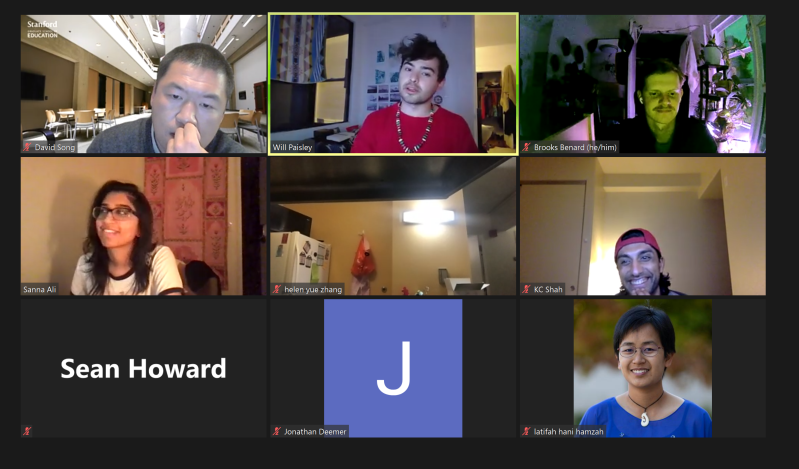The Graduate Student Council (GSC) outlined priorities for its upcoming discussion with University leadership at its Wednesday meeting, placing emphasis on financial issues for graduate students and transparency about policy decisions.
Though there is currently no timetable for the meeting, the Council will “pursue the opportunity as soon as scheduling allows,” GSC co-chair Will Paisley ’20 M.A. ’21 said. In February, University President Marc Tessier-Lavigne and Provost Persis Drell committed to attending a GSC meeting after the council raised concerns that student voices were not sufficiently incorporated into administrative decisions.
While councilors raised a variety of subjects — ranging from increasing transparency about on-campus rent pricing to taking the necessary steps toward departmentalizing the African and African American Studies (AAAS) program — for the meeting with administrators, the council will vote and narrow down the list to three to five items to focus on during the meeting.
For many councilors, working toward better financial support for graduate students is at the top of the list of issues they hope to raise with administrators. Chief among these concerns is the subject of rising on-campus rent for graduate students. In the 2019-20 academic year, average monthly rent for single student housing on campus increased 4.5% from the previous year. In the 2020-21 academic year, while monthly rates increased by 4.5% again year over year, the overall average rent increased by 16% due to the addition of EVGR apartments.
The councilors called on Stanford to provide more clarity about how the University sets rent prices, and work toward increased affordability.
“A lot of grad students are employees, so it’s kind of this company town situation where our employer is setting how much our paycheck is, and then they’re also setting how much we’re paying rent,” said Councilor Sanna Ali, a fourth year Ph.D. student in communication. “They will say, ‘We gave you a 6% raise this year,’ but that doesn’t really account for all these other increases.”
Single student housing rates reached 39.9% as a percentage of income this year, a jump from the previous year’s 36.2% figure. To Councilor K.C. Shah J.D. ’22, the rising rent prices on campus are doubly concerning given the current financial crisis the U.S. is going through. In the Bay Area, the housing market has been dramatically affected by the COVID-19 pandemic, with rents in San Francisco plummeting by 27% since last March.
“It’s cheaper to live in San Francisco than in EVGR,” said Paisley, referring to Escondido Village Graduate Residences. He currently lives off campus in San Francisco. “It’s crazy.”
The councilors also plan to discuss University-sponsored healthcare plans with administrators. Healthcare plans on campus are a patchwork, according to the GSC, with only some graduate departments covering the cost of healthcare for their constituents.
The GSC plans to ask the University to guarantee insurance coverage within all graduate programs, in addition to providing healthcare coverage and financial support for dependents of graduate student workers.
Another priority for the Council is increased transparency surrounding the University’s funding of law enforcement. Ali said that she has seen officers from the county ticket students on campus, and would like more clarity about how and why the University contracts county law enforcement. Multiple councilors added that they would like to see the University reallocate a significant portion of the money it appropriates for funding the police to mental health.
SCPD or the Sheriff’s Office did not immediately respond to a request for comment.
Specifically, Shah raised the possibility of rerouting the funding to groups such as Counseling & Psychological Services (CAPS) that could respond to behavioral and mental health crises. In October, the University announced that ambulance services would replace police in transporting most students under psychiatric holds, though police will continue to respond to such incidents.
“I know some in GSC think that policing is something that keeps the community safe, and I think that is partially true,” Shah said. “But I think a lot of people, especially people of color on this campus, can’t extricate policing from the fact that it’s universally still a source of concern for them.”
Following the University’s announcement that it would work toward departmentalizing AAAS, the GSC will urge the administration to take the necessary steps toward establishing the department. One key step that the GSC will emphasize is a cluster-hire of Black Studies scholars, a move that Ali said would “bring Stanford up to par with other elite institutions with AAAS departments.”
Paisley said that, though many of the changes the GSC is pushing for will not have an immediate impact, the Council is focused on long term progress that will help strengthen the Stanford community once the pandemic subsides.
“I would like to think that in the fall, when things are more normal, that there will be a robust revitalization of the culture that existed, and that can be improved,” Paisley said. “Because there’s a lot of healing that needs to take place.”
This article has been updated to show that The Daily reached out to the county sheriff’s office for comment. It has also been updated to clarify the rent increase in the 2020-21 academic year.
